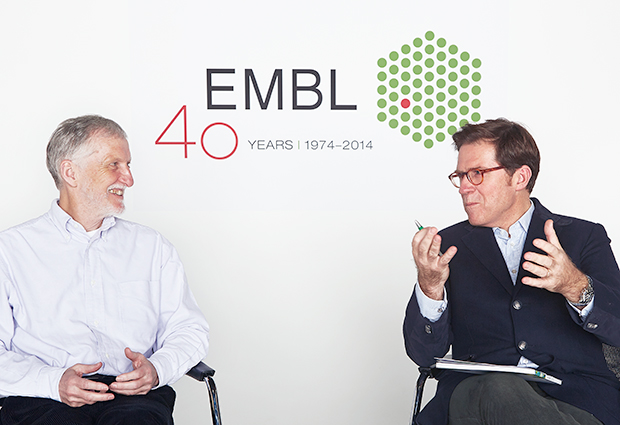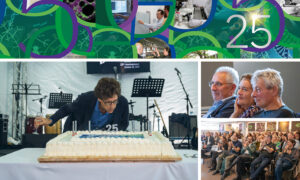
Successes, challenges and the future
As a birthday gift to EMBL, the Alumni Association initiated an anniversary magazine documenting EMBL’s path from a newly established laboratory in the hills of Heidelberg to a multi-site, global leader in modern molecular biology.


The 40-page magazine, produced by the Alumni Relations office and entitled 40 Years EMBL, includes voices of staff and alumni, an EMBL timeline, scientific highlights, and photos spanning back to 1973 – when CERN announced a “birth in the family”. Here, Giulio Superti-Furga, Chair of the Alumni Association, interviews Iain Mattaj, EMBL Director General. View and download a full version of the magazine >
Iain, what are the most important ingredients of EMBL’s success over the past 40 years?
I don’t think there is a single ingredient. The turnover system is a critical aspect of how EMBL functions, because people need to be able to succeed in a short time. This provides constraints on how EMBL has to be organised, but it also provides incentives. I think one of the secrets of EMBL is that the Unit heads are always looking for people with the potential to open new scientific directions. That takes everybody’s science further and I think that it’s a cultural thing, to always be looking for people who can do things you yourself cannot do.
What measures do you take as DG to ensure that group leaders have the freedom to explore new areas?
For me the most critical thing about developing as an independent scientist was being able to bounce my latest idea or my latest results off people who understood and who were interested in what I was doing, without fear. EMBL helps people be fearless about exposing their ideas.
EMBL helps people be fearless about exposing their ideas.

What is the biggest threat for the future?
One reality of life as a leading research institute is that it’s expensive. And another is that we need the ongoing support of our member countries. They have always been extremely supportive and very generous with EMBL. In a period of recession like now, these countries need to be brave to continue to invest in education and research. Lack of funding is a danger but I do think the countries really do appreciate the quality of what EMBL is doing, the way EMBL works and what they get back from EMBL.
The organisation has been very innovative. We as alumni admire that no matter how high the bar gets EMBL seems to be capable of jumping over it.
I think a major part of the explanation was in my answer to your first question. Choosing the right people. Another is related to the fact that we are intergovernmental rather than national and therefore both want and need to serve our member states. In the context of molecular biology this means we have to try to do things in ways or in combinations that national labs do not or cannot do. The fact that we have major activities in providing scientific services, in technology development and transfer, in advanced training and in international collaboration in addition to research is a powerful motor and motivation for developing new ways in which these activities can interact productively and synergistically. I can’t think of a single other life science organisation that has the same drivers for innovation.
How do you recognise hidden heroines and heroes?
I think there are lots of people who make the place work. EMBL does many things, from research through services to courses and conferences to open days for visitors to helping develop European scientific initiatives. People throughout the organisation, in administration and in support services, give up their time to make it more pleasant for people to be here either as staff or as visitors. The staff association plays an important part in keeping EMBL a happy place, and the alumni association makes it easy and interesting for everyone to stay connected with EMBL for life.
Did EMBL start technology transfer and industrial relationships too late? On reflection, would you do something differently?
Historically I think EMBL started late. Wilhelm Ansorge and others were engaged in technology development and commercialisation from the very beginning, but this wasn’t made use of in an institutional way. People gradually became aware that to develop intellectual property and to be involved in its use (or translation as it is now referred to) was an interesting intellectual activity in its own right. Everybody learns something from being engaged in new activities and I found being involved in technology transfer and helping set up a company completely fascinating. It is a totally different world, with completely different values than the values that I used as a researcher, and this broadened my worldview.
I found being involved in technology transfer and helping set up a company completely fascinating.
What do you think could be themes that the new director could take on in the next 10-15 years? Where is EMBL going?
Biology will continue to become more relevant to human health and this will change EMBL. The development in imaging technologies will continue, as will the ability to “do biochemistry” using imaging. We need to be flexible. People have asked whether EMBL should do more immunology, plant biology or neuroscience. The answer is maybe yes, but we need to have the right people with the right ideas to do so.
What about the deluge of data?
Well I think there has been a paradigmatic change. When we both started in life science and molecular research, we could understand intuitively what we were doing and what our results meant. We didn’t need anybody to explain them to us. Nowadays that’s no longer the case; many data sets are not intuitively comprehensible and so we need computationally based methods of data analysis and that brings with it a whole set of new requirements. One of these, in research as in many walks of life, is the capacity to deal with big data.
Is there something you want to say on the occasion of this fantastic and important 40 years of EMBL?
It is a privilege to be here – it’s a really exciting and fun place to be, and I’m enormously grateful for the support the community of EMBL staff and alumni give to the Lab that keeps the place running


